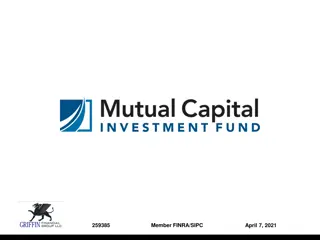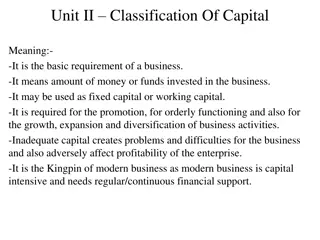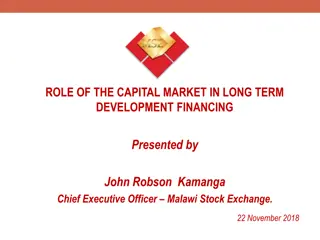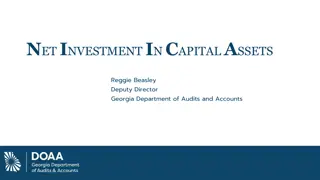Exploring Opportunities in the Nigerian Capital Market
The Nigerian Capital Market offers abundant opportunities for individuals, institutions, and government entities, allowing for wealth creation and career development. Through avenues like REITs, investors can tap into diversified portfolios of income-producing real estate projects. Career paths within the market include roles such as stock brokers, portfolio managers, and investment advisers, providing a wide range of opportunities for professionals.
- Nigerian Capital Market
- Wealth Creation
- Career Development
- Real Estate Investment Trusts
- Investment Opportunities
Download Presentation

Please find below an Image/Link to download the presentation.
The content on the website is provided AS IS for your information and personal use only. It may not be sold, licensed, or shared on other websites without obtaining consent from the author. Download presentation by click this link. If you encounter any issues during the download, it is possible that the publisher has removed the file from their server.
E N D
Presentation Transcript
OPPORTUNITIES IN THE NIGERIAN CAPITAL MARKET By Esuk, E. I. Morenikeji (Mrs.) Securities & Exchange Commission
The Capital Market has abundant opportunities that can be tapped by all; Individuals Institutions Various levels of Government The economy at large.
Opportunities to Individuals Wealth Creation Career Development
Wealth Creation Through a combination of the following Dividend Capital appreciation Bonus
Career Opportunities One could develop a career in any of the following ; Stock brokers Portfolio Management Fund Managers Underwriters Solicitors Trustees Issuing house Investment advisers Registrars Estate surveyors Other Capital Market Professionals including Reporting Accountants, Auditors, Engineers etc Even Regulator
As an Estate Surveyor, you can create your own space where you can operate and excel in the Capital Market especially in Real Estate Investment Trust.
Real Estate Investment Trusts (REITs) Real Estate Investment Trusts are Real Estate Financing Vehicles that are modelled after Mutual (or Unit Trust) Funds. REITs own, and in most cases, operate Income-producing Real Estate Projects. The REITs structure are created to provide all types of investors (Private Individuals and Institutions) the opportunity to invest in large scale, diversified portfolios of Income-producing Real Estates in the same way they typically invest in other asset classes through the purchase and sale of liquid securities
REITs cont. When investors buy shares in REITs, the share sale proceeds are used to buy or construct Commercial or Residential Real Estates. A single REIT invests in a wide range of properties located in different locations so as to protect investors in the event that Real Estate prices decline in a particular market. Investors receive dividends that are comprised of rental income and or profit generated from property sales.
Advantages of REITs Diversification Dividend Liquidity Performance Transparency Growth/Capital appreciation Access to more efficient, effective and better priced funding
Genesis of REITs The genesis of REITs can be traced back to 1960 where, through a legislative action, the US Congress gave all Americans (not just the affluent few) the opportunity to invest in Income Producing Real Estates in a manner similar to how Individuals and Institutional Investors invest in Share and bond
REITs in similar economies Ghana s Home Finance Company (HFC) established its 1st REIT in 1994. The HFC is at the forefront of Mortgage Financing in Ghana and is regulated by the SEC. In 2007, SEC Nigeria set and issued guidelines for the Registration, Issuance and Operationalization of REITs in Nigeria. The 1stsuccessful REIT was launched in 2008, enabling the Union Homes Hybrid Real Estate Investment Trust to raise over N50 billion. In Kenya, The Capital Market Regulator CMA, has from December 2013, licensed 5 Companies to manage REITs in their preparations to launch REITs in the Nairobi Stock Exchange later this year.
Opportunities to Institutions Institutions stand to gain a lot from tapping into the Capital Market e.g. Access to capital Access to cheaper funds than if raised from banks. Listing on the Stock Exchange this boosts the image of the Company. Visibility to the Company and its products
Opportunities to Government Federal and State Government can raise funds to finance their Development Targets from the Capital Markets through Bonds issuance. Example; Lagos State has issued various Bonds to finance different projects. Ondo State has also issued Bonds for the financing of various projects.
Opportunities to the Economy at Large Growth in the Capital Market will affect the overall welfare of the Economy as this will create an avenue for the availability of Cheap, long-term funds for Stakeholders to enable them carry out their various responsibilities. A successful Capital Market also indicates to the investing public, both Local and International, that the economy is strong and stable.
Conclusion Opportunities abound in the Capital Market for everyone at different levels. Awareness of the inherent risks and an amour of the proper information are well needed by all stakeholders to help seize full advantage and obtain the maximum benefit from the Nigerian Capital Market.























